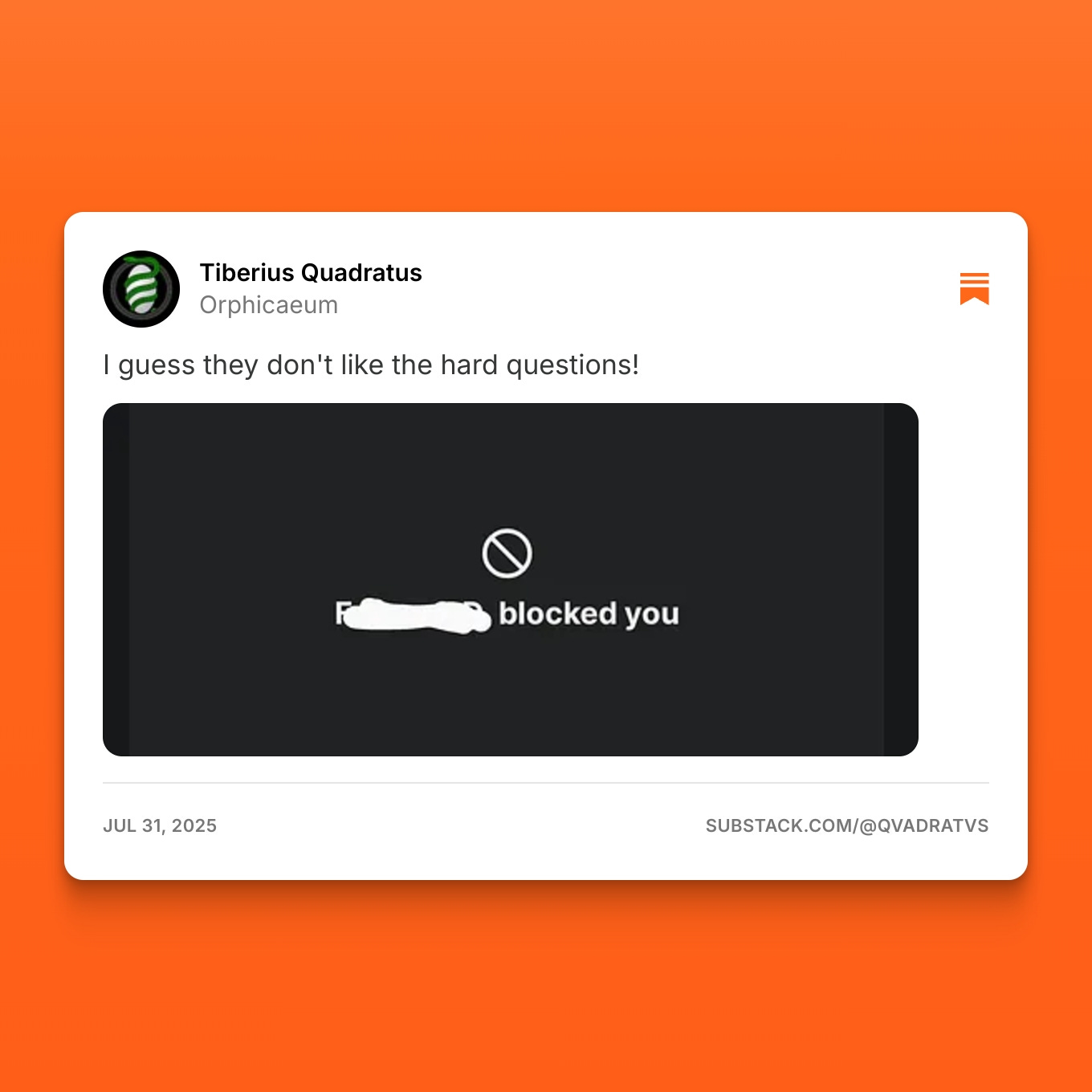On Being Qualified to Teach
A Brief Detour to Address the Issue of AI
I moved 1300+ miles across the country this week, and so I have moved On the Many Names of Orphic God, Part II to next Thursday to allow more time to work. From there, posting will continue bi-weekly as normal. What follows here is a brief detour in style and in tone from our usual work. Instead of just delaying the next essay, I wanted to post this today. In it, I reflect on another, nameless newsletter's use of AI.
Yesterday, I canceled my paid subscription to a newsletter which I had previously enjoyed, whose author I had held before in high regard. (I’m not interested in shaming anyone, so I will not mention which newsletter.) The author of this newsletter very obviously relies on AI to write their content. The publication overall presents a didactic synthesis of a handful of topics I am vaguely familiar with as well as one with which I am intimately familiar. Because of this unique synthesis and this overlap with my interests, I dealt with the blatant and unapologetic use of AI.
In the first-published version of their most recent newsletter (an important distinction, as it has been edited multiple times in the hours since), the author “quoted” a text that I have studied religiously. My problem is that the quote, while close to a few sections of the text, was unmistakable as the kind of made-up half-quote that only AI (or someone deliberately lying) is capable of.
I don't know what I expected from somebody who didn't go to any lengths at all to conceal their use of AI. Reflecting now, how many other times could they have misquoted or completely fabricated quotes due to their reliance on what reads like the free version of your favorite LLM? This, for me, was enough. I cancelled everything, in the way that ends the benefits immediately even though I'd already paid for the upcoming month. I filled out the cancellation survey, and I said my piece and made my peace with the author on that form.
I know that they read every word of what I wrote on that form, because the article was revised very quickly to remove reference to the misquoted text as well as to the parts of that quote inserted by AI. After that update, the quote was more accurate and it was introduced with a more vague but accurate identifier. That is fine, and that is where I would've left it. I then posted the following note:
If nothing else, I pledge this to those who read me: If I misrepresent something, it is because I myself have misunderstood it. I will never quote a passage that I have not read, and I will especially never ask AI to do so on my behalf.1
Maybe this note struck a chord. I waited a while, but curiosity took hold of me, and so I checked the newsletter again. At the time of writing this, the newsletter still has the fixed quote, but also now it is introduced with a parenthetical remark. I'm sure you know the type:
I shouldn't have paraphrased!
I mislabeled it!
I'm just tired!
Woe is me!2
The disservice that you do in your lies is only to yourself. To misunderstand a quote is one thing. To misquote is another. To fabricate quotes, even unknowingly, is in a whole different ball park.
To care so little about what you claim to be teaching that you don't even verify the passages you quote is an insult both to the source material (if you yourself can even call it that), and to the readers, that you manipulate.
From where does a teacher derive their authority? What gives someone the right to explain something to others? It is universally accepted that for a teacher to be worth learning from, they themselves must understand the subject being taught. A misquote in itself is not equal to misunderstanding, but the kind of misquote that I saw (and then saw hidden, and then again saw justified) absolutely is, and so much more.
A teacher’s authority is derived from their ability to demonstrate mastery of a subject. AI has made it so that anyone, with enough prompting, is able to simulate mastery. However, all the prompting in the world could only ever demonstrate the LLM’s mastery of a subject, and not your own. That is, if it could demonstrate mastery! In some cases, like the one I'm writing about, it can't even do that.
Please, Reader, ask yourself: would you want to learn from someone who won't admit when they're wrong? From someone who doubles down with excuses and half-hearted, dismissive non-apologies?
And you, who is at fault, if you've read this, ask yourself: do I believe what I publish? Do I expect anyone else to? How can I right these wrongs?
Finally, to whom it may concern, ask yourself this, frequently and sincerely: what does the author stand to gain from writing this? Understanding the motives of an author can tell you more about their misquotations than their self-corrections ever will.
Thank you for supporting Orphicaeum, and for supporting me. Rest assured that the mastery you find here will never be simulated or artificial. Our regularly-scheduled programming continues a week from today.
Edit3:
https://substack.com/@qvadratvs/note/c-140489430
Of course, now I’m paraphrasing. See how that works, Brother?
https://substack.com/@qvadratvs/note/c-140826582


